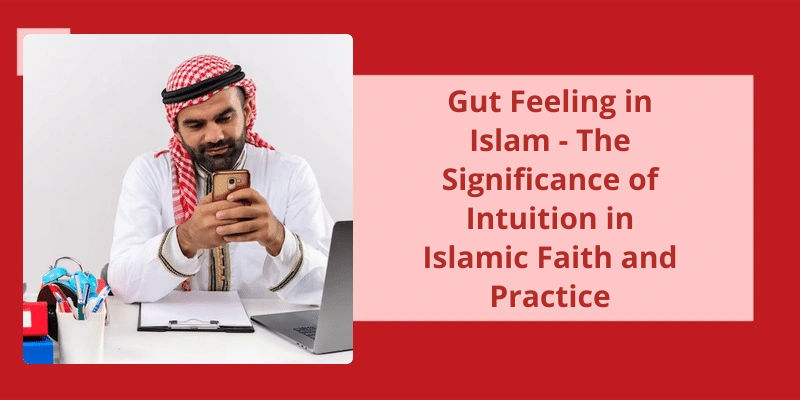As human beings, we’re often reminded to trust our instincts, or what’s commonly referred to as our "gut feelings". In Islam, this innate intuition is believed to be a special gift from God, and holds great significance in guiding an individual's decisions and actions. Muslims are encouraged to pay attention to their inner voice, as it’s believed to serve as a divinely-inspired source of guidance that can help one navigate through life's challenges. However, while gut feelings are viewed as a valuable tool in Islam, they’re also considered to be subordinate to reason and rationality.
What Is the Concept of the Heart in Islam?
The Quran acknowledges the heart as the origin of belief and faith, emphasizing it’s crucial role in the spiritual development of a person. It’s through the heart that one establishes a connection with God as it’s believed to be the receiver of divine revelation and inspiration. The heart is also seen as the seat of true intention and sincerity, as it’s where a persons genuine intentions reside.
Islamic scholars expound on the concept of the heart through the principle of “Tazkiyah al-Nafs,” which means purification of the soul. They argue that the heart can be purified through spiritual exercises, such as prayer, fasting, and reflection, as well as by the remembrance of God. When the heart undergoes purification, it becomes the source of divine guidance and inspiration, leading to righteous actions and behavior.
Furthermore, Islamic thought views the heart as the place where an individuals innermost thoughts and desires are stored. It’s through self-reflection and introspection that one can identify and address any impurities or flaws within their heart. According to Islamic belief, a pure heart exhibits humility, compassion, empathy, and gratitude. It’s also devoid of negative traits, such as envy, greed, and egoism.
The Connection Between the Heart and the Intellect in Islamic Philosophy.
- According to Islamic philosophy, the heart isn’t just a physical organ but also the center of intellect and spirituality.
- The heart is believed to be the organ that perceives and understands the divine knowledge and is the place where faith resides.
- Islamic scholars have emphasized the importance of purifying the heart through acts of worship, such as prayer, fasting, and giving charity, in order to gain wisdom and understanding.
- The heart is also seen as the seat of emotions and desires, which can either lead one towards good or evil depending on their intentions and actions.
- Therefore, maintaining a healthy balance between the heart and intellect is crucial in attaining true wisdom and righteousness in Islam.
It’s important to remember that sadness, grief and depression are natural emotions that we all experience at certain stages of our lives. In Islam, there are many ways to deal with these emotions and seek help. Seeking counsel from others is a fundamental part of this process. In the following section, we will explore some ways in which Muslims can find solace and support in times of sadness and grief.
How to Deal With Sadness in Islam?
This is because seeking counsel from others can help individuals gain new perspectives on their problems, find comfort in the wisdom of others, and receive emotional support. It’s recommended that Muslims seek counsel from trusted individuals such as family members, friends, and Imams. Additionally, in order to deal with sadness in Islam, it’s important to practice self-care. This can include engaging in regular physical exercise, eating a balanced and healthy diet, and engaging in activities that bring joy and happiness.
Practicing dhikr, or the remembrance of Allah, is another important aspect of dealing with sadness in Islam. This can involve reciting Quranic verses, saying positive affirmations, or simply reflecting on the greatness of Allah. The act of dhikr can help individuals connect with a higher power, find a sense of peace and comfort in the divine, and remind them that they aren’t alone in their struggles.
It’s also important for Muslims to remember that sadness and grief are natural and normal human emotions. It’s okay to feel sad, to cry, and to mourn. It’s important to acknowledge and accept these emotions as part of the healing process. This can involve taking time to reflect on one’s feelings, seeking support from others, and engaging in spiritual practices that provide solace.
In addition to seeking counsel from others and practicing self-care, Muslims can also turn to the Quran and Sunnah for guidance on dealing with sadness and grief. The Quran and Sunnah provide numerous examples of how the prophets and righteous individuals of the past dealt with challenges and hardships. These stories can serve as a source of inspiration and guidance for Muslims who’re struggling with sadness and grief.
By adopting these strategies, Muslims can find comfort in their faith, heal from their sadness, and find a sense of peace and contentment in their lives.
Source: 10 Ways to Battle Depression: When Prayer (Salat) Doesn’t …
As we delve deeper into the topic of Islam and emotions, it’s important to understand that Islam places great emphasis on balance and moderation. By avoiding extremes in both negative and positive emotions and striving for equilibrium, Muslims can achieve inner peace and harmony with the world around them. Let’s explore further what Islam has to say about emotions and how they should be managed.
What Islam Says About Emotions?
The Islamic concept of emotional intelligence focuses on recognizing and understanding the range of emotions that humans experience. It encourages individuals to control their emotions and strive to maintain a balanced emotional state. Islam emphasizes the importance of a positive attitude, a kind heart and a calm mind.
Islam teaches that negative emotions, such as anger, envy, greed, and jealousy, are like diseases of the soul. They can lead to spiritual and mental illnesses, which can eventually harm individuals and those around them. This can lead to destructive behavior, including violence, abuse, and hatred. Therefore, Islam encourages individuals to control these negative emotions by using positive tools such as forgiveness, patience, and compassion.
The Islamic tradition emphasizes the importance of emotional bonding and empathy with others. It encourages believers to exercise kindness and compassion towards themselves, their family and their communities. It also supports the idea of emotional honesty and encourages individuals to speak out about their emotions in a respectful way.
Islamic teachings also emphasize the importance of managing stress and anxiety. Muslims are encouraged to use prayers and worship as a way of releasing tension and finding inner peace. Islam places a high emphasis on emotional and spiritual health, and this includes managing negative emotions that can lead to stress, anxiety, and depression.
In Islamic spirituality, intuition plays a significant role in understanding the unseen realm and connecting with the divine. Sufism, in particular, emphasizes the importance of developing this innate faculty to tap into the knowledge of qalb, which enables one to perceive the ultimate reality beyond the limitations of the mind and intellect. Let’s explore how intuition is perceived as an essential aspect of spiritual growth in Islam.
What Is Good Intuition in Islam?
Intuition is believed to be a gift from Allah and a means of spiritual guidance that helps Muslims distinguish between right and wrong. It’s also seen as a manifestation of Gods mercy and grace towards those who strive to follow His path.
Sufi scholars emphasize the importance of cultivating intuition through spiritual practices such as dhikr (remembrance of God), meditation, and contemplation. They argue that intuition isn’t something that can be taught or acquired through study alone, but rather a state of consciousness that can only be attained through direct experience of the divine.
Muslims believe that every human being is born with an innate sense of what’s right and wrong, and that this sense can be sharpened through spiritual practice. They also believe that the purpose of religion is to awaken and nurture this innate sense of intuition and guide it towards divine truth.
How Intuition Is Viewed in Other Religions, Such as Christianity, Judaism, and Buddhism
Intuition is a recognized concept in various religions including Christianity, Judaism and Buddhism. It’s often viewed as an innate ability to perceive or understand something without using reason or logic. In Christianity, intuition is often associated with the Holy Spirit, whereas in Judaism, it’s viewed as a form of divine inspiration. In Buddhism, intuition is considered as an essential aspect of attaining enlightenment and is often linked with meditation practices. These religions share the belief that intuition provides a valuable source of guidance and insight.
It’s fascinating to explore the concept of extrasensory perception and what different religions have to say about it. While some believe in the sixth sense, others may view it as a heightened sense granted by a higher power. In the case of Islam, the acceptance of such blessings is encouraged. However, it’s important to note that Islamic teachings emphasize the importance of knowledge acquired through logic, reasoning, and observation. With that in mind, let’s delve deeper into what Islam says about the sixth sense and it’s significance.
What Does Islam Say About Sixth Sense?
In Islam, God is the ultimate source of all knowledge and wisdom. It’s believed that God has given humans the ability to reason and understand the world around us. However, there are certain individuals who may possess a heightened perception or intuition that’s beyond ordinary human capabilities.
This sixth sense may manifest in different ways, such as prophetic dreams, visions, or a sense of just knowing something to be true. These individuals aren’t considered prophets, as prophethood is a unique status reserved for certain individuals chosen by God to deliver messages to humans. However, they may possess certain insights or knowledge that others do not.
Islam teaches that all knowledge comes from God, and it’s up to humans to seek out that knowledge through study, observation, and reflection. Therefore, even if someone possesses a sixth sense or extrasensory abilities, it doesn’t mean that they’ve access to knowledge that isn’t available to others. It simply means that they’ve a different way of perceiving and interpreting information.
In Islam, it’s important to rely on reason and evidence when making decisions or judgments. While intuition and gut feelings can be useful, they shouldn’t be relied upon exclusively. Muslims are encouraged to seek knowledge and understanding in all aspects of life, including matters pertaining to the sixth sense.
Conclusion
In conclusion, Islam highly values the concept of "fitrah," which refers to the innate human nature or disposition. This includes the ability to recognize and distinguish right from wrong, which is closely tied to the concept of "gut feeling." Muslims are encouraged to rely on their fitrah and follow their instincts when facing difficult decisions or situations where ethical considerations are involved. The Quran and Hadith also emphasize the importance of seeking knowledge and guidance from trusted sources, such as religious scholars, before making important decisions. By combining these teachings, Muslim individuals can cultivate a strong sense of intuition and rely on their gut feeling as a valuable tool in navigating their lives.





